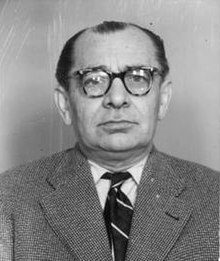Josef Klehr
| Josef Klehr | |
|---|---|

Klehr in custody of the Frankfurt Police.
|
|
| Born |
17 October 1904 Langenau, Province of Silesia, German Empire |
| Died | 23 August 1988 (aged 83) Leiferde, West Germany |
| Allegiance |
|
| Service/branch |
|
| Rank | Oberscharführer, SS |
| Battles/wars | World War II |
Josef Klehr (17 October 1904, Langenau, Upper Silesia – 23 August 1988, Leiferde) was an SS-Oberscharführer (master sergeant), supervisor in several Nazi concentration camps and head of the SS disinfection commando at Auschwitz concentration camp.
Klehr was born as the son of a teacher. After attending the Volksschule in Wohlau until 1918 he got an apprenticeship with a cabinet maker, passing the exam in 1921 that allowed him to do it by trade. As of 1934 he worked as a night porter in a community home, then subsequently as a nurse in a sanatorium. From 1938 he was assistant sergeant at Wohlau prison.
Klehr was a member of the Nazi Party and Allgemeine SS as of 1932. He participated in military exercises with the Wehrmacht and received training to become a medic. Shortly before the beginning of the war he was drafted into the Waffen-SS. In August 1939 he was transferred to Buchenwald concentration camp as a guard, then to Dachau concentration camp as a medical orderly a year later. In January, 1941 he was promoted to SS-Unterscharführer and transferred to Auschwitz, working as a medical orderly in the prisoners' infirmary.
Klehr was renowned for killing by phenol injections into the heart, something he essentially took over as of some time in 1942. He devised ways to optimise the speed of the killing process, such as experimenting with the positioning of prisoners before their injection.
Klehr occasionally conducted selections himself, and when he was informed that the camp doctor was unavailable, stated immediately, "Today I am the camp doctor.” Due to various descriptions of him standing against a background of corpses "wearing either a white coat or “a pink-rubber apron and rubber gloves” and “holding a 20-cc hypodermic with a long needle” in his hands, Klehr has been described as the "ultimate caricature of the omnipotent Auschwitz doctor."
...
Wikipedia
